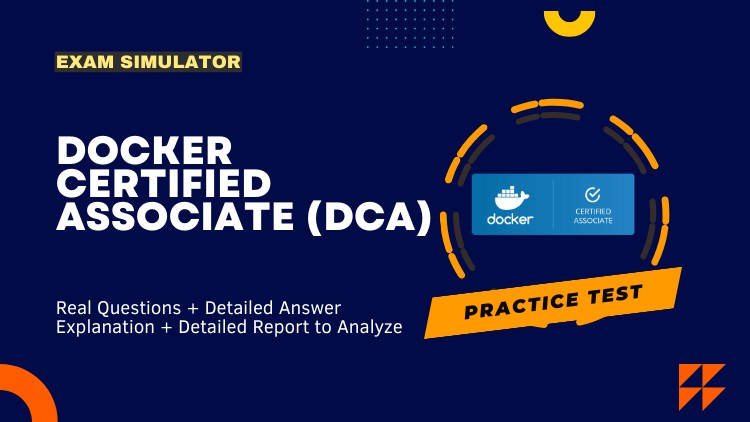
Prepare for your DCA exam. 3 high-quality practice test questions written from scratch with detailed explanations!
What you will learn
Gain Expertise in all Domains as per DCA exam coverage
Detailed explanation for correct and incorrect answers
Reference links for each question for further study
Domain mapping for each question to Analyze results
Description
Ace Your Docker Certified Associate (DCA) Exam with Our Practice Test!
Are you ready to take your Docker skills to the next level and become a certified Docker Certified Associate (DCA)? Prepare with confidence using our comprehensive DCA certification exam practice test!
Welcome to the best practice exams to help you prepare for your Docker Certified Associate (DCA) exam.
These practice exams have been authored by SME who has years of experience in Docker and is certified DCA.
The tone and tenor of the questions mimic the real exam. Also it contains the detailed description provided within the explanations, we have also extensively referenced Docker documentation to get you up to speed on all domain areas being tested for the DCA (Docker Certified Associate) exam.
We want you to think of this course as the final pit-stop so that you can cross the winning line with absolute confidence and get DCA Certified! Trust our process, you are in good hands.
All questions have been written from scratch and more questions are being added over time!
Why Choose Our DCA Practice Test?
Exam-Ready Content: Our practice test is meticulously designed to mirror the actual DCA exam, ensuring you’re well-prepared for the real thing.
DCA Expertise: Created by Docker experts with years of experience, our practice test covers every topic and concept you’ll encounter in the certification exam.
Hands-on Scenarios: Gain practical experience by tackling Docker scenarios and challenges that closely resemble real-world situations.
Timed Simulations: Get a feel for the time constraints of the DCA exam with our timed simulations, so you can manage your time effectively during the actual test.
Comprehensive Coverage: Covering all DCA exam objectives, our practice test is your one-stop resource for mastering Docker.
Detailed Explanations: Understand the reasoning behind correct answers with in-depth explanations for each question, ensuring you learn as you practice.
Success Guarantee: Boost your confidence, reduce exam anxiety, and increase your chances of passing the DCA certification exam on your first attempt.
What’s Included:
- Practice Questions: Multiple-choice questions and scenarios that challenge your Docker knowledge.
- Performance Tracking: Keep tabs on your progress and identify areas where you need improvement.
- Comprehensive Answers: Detailed explanations and references to Docker documentation for each question.
- Confidence Building: Gain the confidence you need to excel in your DCA exam and demonstrate your Docker expertise to employers.
Sample Question:
What is the purpose of the –grace-period flag when using the kubectl delete command in Kubernetes, and what happens if you specify the –now flag instead?
A) The –grace-period flag specifies the time period during which a resource should be gracefully terminated, allowing processes to finish. Specifying –now forces immediate resource deletion.
B) The –grace-period flag sets the deletion delay for resources. Specifying –now cancels the deletion process for the specified resource.
C) The –grace-period flag is used to define the delay before deleting resources gracefully. Specifying –now will forcefully delete the resource without waiting.
D) The –grace-period flag indicates the duration to wait for resource deletion. Specifying –now has no effect on the deletion process.
Explanation:
Correct Option: A
The –grace-period flag specifies the time period during which a resource should be gracefully terminated, allowing processes to finish. Specifying –now forces immediate resource deletion.
The –grace-period flag is used to specify the time period (in seconds) during which a resource should be gracefully terminated. It allows processes within the resource to finish before the resource is deleted. Specifying –now with the kubectl delete command forces the immediate deletion of the resource, bypassing the grace period. This means that processes within the resource are not given additional time to complete their tasks.
Incorrect Options:
B) The –grace-period flag sets the deletion delay for resources. Specifying –now cancels the deletion process for the specified resource.
The –grace-period flag sets a deletion delay, which is not accurate. It also inaccurately states that specifying –now cancels the deletion process, which is not the case.
C) The –grace-period flag is used to define the delay before deleting resources gracefully. Specifying –now will forcefully delete the resource without waiting.
The purpose of the –grace-period flag by stating that it defines a delay before deleting resources gracefully. Additionally, it incorrectly suggests that specifying –now forcefully deletes the resource without waiting, which is correct but not the main purpose of the –now flag.
D) The –grace-period flag indicates the duration to wait for resource deletion. Specifying –now has no effect on the deletion process.
It inaccurately states that specifying –now has no effect on the deletion process. As mentioned earlier, specifying –now forces immediate deletion without waiting for the grace period to complete.
Reference : <reference link>
You can retake the exams as many times as you want
- This is a huge original question bank
- You get support from instructors if you have questions
- Each question has a detailed explanation
- Mobile-compatible with the Udemy app
- 30-days money-back guarantee if you’re not satisfied
We hope that by now you’re convinced! And there are a lot more questions inside the course.
Start Your Journey to DCA Certification Today!
Don’t leave your DCA certification to chance. Prepare effectively and efficiently with our DCA certification exam practice test. Take the first step toward becoming a Docker Certified Associate and showcasing your expertise in containerization technology!
Happy learning and best of luck for your Docker Certified Associate (DCA) exam!